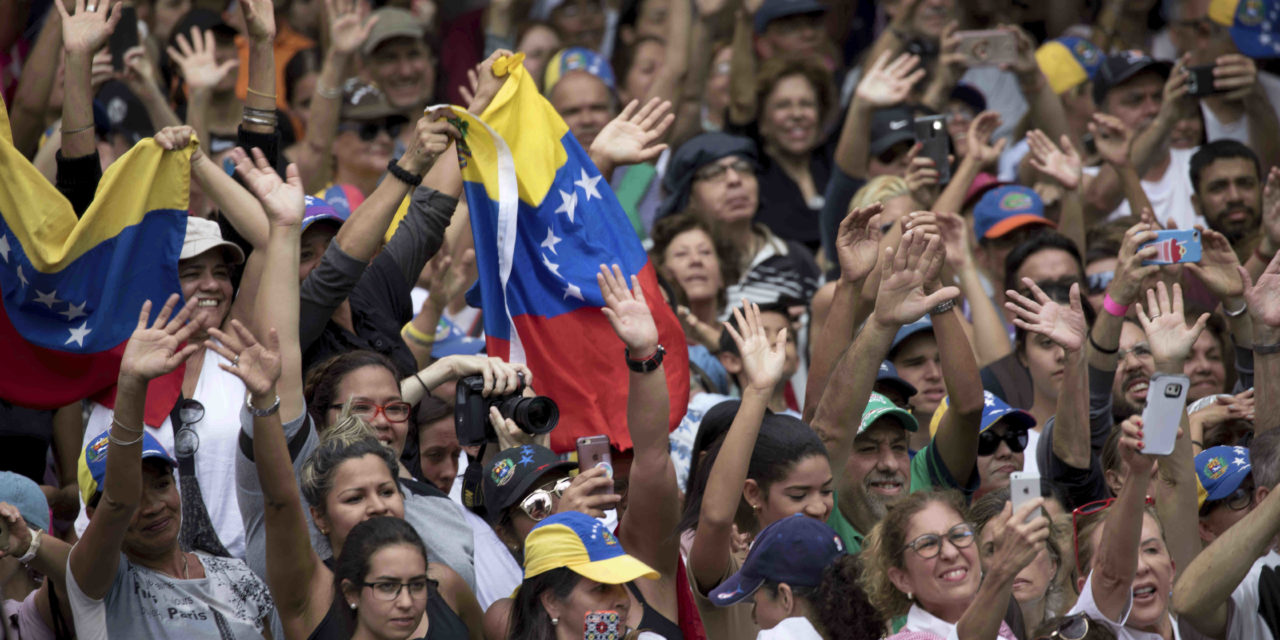Google Translate available in: Español
(AP Photo/Ariana Cubillos)
On December 30th, the opposition-led National Assembly elected in 2015 in Venezuela voted to terminate the figure of the “interim government.” This effectively ended the internal leadership role of Juan Guaidó, who had been recognized by the U.S. government and some of its allies as the interim president of Venezuela since 2019. Three of the four major opposition parties (Un Nuevo Tiempo, Primero Justicia, and Acción Democratica) in the 2015 National Assembly voted in favor of ending the opposition’s claim to an interim government as of January 4th, while Voluntad Popular (led by Guaidó’s mentor Leopoldo López) and members of several smaller parties objected. This vote demonstrated many members of the opposition see a need for a change in strategy, especially with presidential elections due in 2024.
After its initial creation in 2019, the interim government was supported by over 60 percent of Venezuelans, and Guaidó was recognized internationally as interim president by nearly 60 countries, including the United States—even though most of these countries also maintained diplomatic relations with the de facto Maduro government. However, as the Covid-19 pandemic hit and the Maduro regime continued to crack down on civic spaces, Guaidó struggled to gain traction in the fight for democracy and his popularity declined as people lost faith in the interim government’s ability to initiate a democratic transition. In 2020, a study done by Venezuelan pollster Datanalisis found that Guaidó’s approval stood at only 26 percent in May 2020, while Maduro’s approval was at 13 percent. This growing dissatisfaction became increasingly evident in the recent vote to end the interim government, where 78 members of the National Assembly voted in favor, with 29 opposed and 8 abstaining.
The December 30 vote marks a new path forward for the Unitary Platform, a broad opposition political alliance represented by the negotiating team participating in the Mexico City dialogue process. There are new questions as to their internal structure and unity, as well as how this change in strategy will affect opposition primary elections expected to take place this year, ahead of the 2024 presidential elections in Venezuela. This vote also demonstrated increasing division among the opposition, particularly between Voluntad Popular and the other three opposition parties, Acción Democrática, Primero Justicia and Un Nuevo Tiempo. On January 12, while representatives of the Unitary Platform negotiating team were in Washington, Leopoldo López (leader of Voluntad Popular and mentor to Guaidó) publicly criticized the other parties, and claimed that two of their negotiators had been co-opted by Maduro. In response, the Unitary Platform released a statement expressing their commitment to the Venezuelan people and emphasizing the importance of unity, stating that “The adversary is in Miraflores, not among us.” With these internal divisions, the challenge moving forward is less about the end of the interim government itself, but what that change in structure means for how the opposition will reframe and reorganize itself to find a unified candidate ahead of the 2024 elections.
Following the dissolution of the interim government, the 2015 National Assembly will form a series of committees that will oversee aspects of governance previously handled by the interim government. To lead these committees, on January 5th the opposition-controlled body appointed three exiled lawmakers who currently reside in Spain and the United States as the new leaders of the legislature. Dinorah Figuera, a surgeon living in exile in Spain since she was forced to flee Venezuela in 2018, will be president of the assembly, with Marianela Fernandez serving as the first vice president and Auristela Vasquez as second vice president. As the first all-female leadership of the opposition in Venezuela, these women represent the opposition parties Primero Justicia, Un Nuevo Tiempo and Acción Democrática, respectively.
On January 10th, Figuera installed the Delegate Commission, which will be the functional body of the 2015 National Assembly throughout 2023. Figuera announced the 15 permanent committees that will comprise the commission and designated presidents and vice presidents for each of them. Four of these committees will be led by Acción Democratica, four by Primero Justicia, three by Un Nuevo Tiempo, two by Voluntad Popular and two by a smaller party known as Encuentro Ciudadano. These committees will deal with an array of issues, including domestic policy, foreign policy, finance, energy and petroleum, defense and security, social development, indigenous peoples and the environment. This year, the commission is responsible for appointing the Consejo de Administración y Protección de Activos (Management and Asset Protection Board) and overseeing their work. With the dissolution of the interim government, this board is the only body that can assume the defense of assets and funds held abroad as a result of sanctions, on behalf of the 2015 National Assembly.
As the opposition adjusts to the new leadership within the 2015 National Assembly, the question of 2024 presidential candidates for the opposition remains. Acción Democratica was the first party to announce a presidential candidate, nominating Carlos Prosperi while smaller parties such as Causa R, Vente Venezuela, Encuentro Ciudadano and Concertación Ciudadana have also confirmed their candidates: Andrés Velásquez, María Corina Machado, Delsa Solórzano and César Péres Vivas. Un Nuevo Tiempo, Primero Justicia and Voluntad Popular have yet to officially name candidates, although it is expected that Voluntad Popular will confirm Juan Guaidó and there are at least three interested individuals in Primero Justicia (Henrique Capriles, Carlos Ocariz and Juan Pablo Guanipa) vying for the slot. However, it still remains unclear as to whether the opposition parties will decide to run with their own candidates or band together to support a unified opposition candidate for the 2024 presidential elections.



